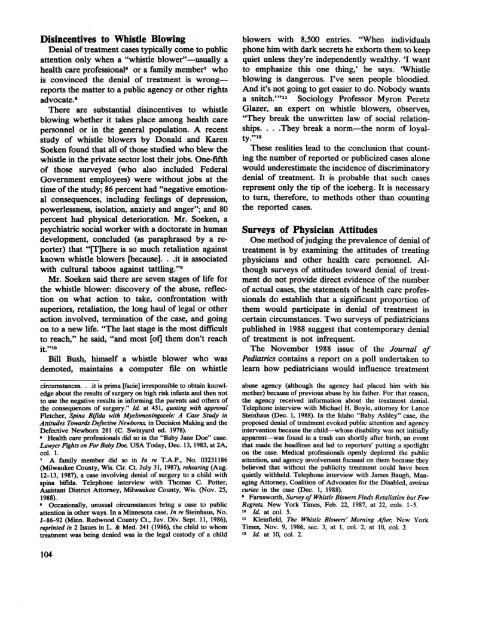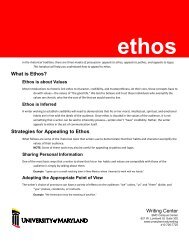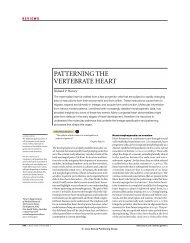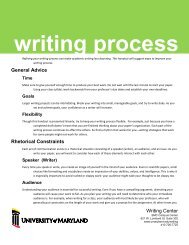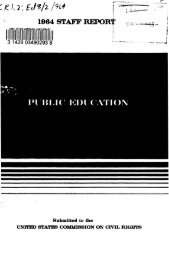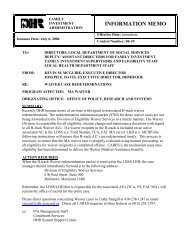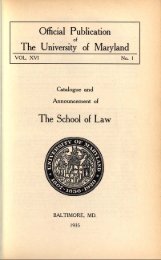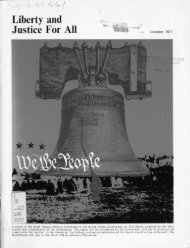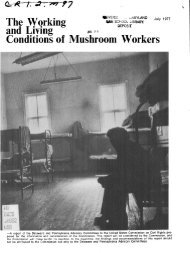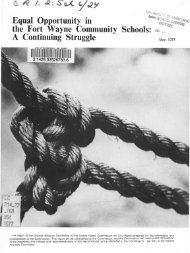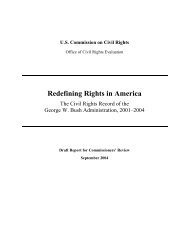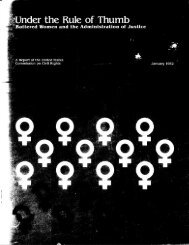Disincentives to Whistle BlowingDenial <strong>of</strong> treatment cases typically come to publicattention only when a "whistle blower"—usually ahealth care pr<strong>of</strong>essional 6 or a family member 7 whois convinced the denial <strong>of</strong> treatment is wrong—reports the matter to a public agency or other rightsadvocate. 8There are substantial disincentives to whistleblowing whether it takes place among health carepersonnel or in the general population. A recentstudy <strong>of</strong> whistle blowers by Donald and KarenSoeken found that all <strong>of</strong> those studied who blew thewhistle in the private sector lost their jobs. One-fifth<strong>of</strong> those surveyed (who also included FederalGovernment employees) were without jobs at thetime <strong>of</strong> the study; 86 percent had "negative emotionalconsequences, including feelings <strong>of</strong> depression,powerlessness, isolation, anxiety and anger"; and 80percent had physical deterioration. Mr. Soeken, apsychiatric social worker with a doctorate in humandevelopment, concluded (as paraphrased by a reporter)that "[Tjhere is so much retaliation againstknown whistle blowers [because]. . .it is associatedwith cultural taboos against tattling." 9Mr. Soeken said there are seven stages <strong>of</strong> life forthe whistle blower: discovery <strong>of</strong> the abuse, reflectionon what action to take, confrontation withsuperiors, retaliation, the long haul <strong>of</strong> legal or otheraction involved, termination <strong>of</strong> the case, and goingon to a new life. "The last stage is the most difficultto reach," he said, "and most [<strong>of</strong>] them don't reachit." 10Bill Bush, himself a whistle blower who wasdemoted, maintains a computer file on whistlecircumstances. . .it is prima [facie] irresponsible to obtain knowledgeabout the results <strong>of</strong> surgery on high risk infants and then notto use the negative results in informing the parents and others <strong>of</strong>the consequences <strong>of</strong> surgery." Id. at 451, quoting with approvalFletcher, Spina Bifida with Myelomeningocele: A Case Study inAttitudes Towards Defective Newborns, in Decision Making and theDefective Newborn 281 (C. Swinyard ed. 1978).6Health care pr<strong>of</strong>essionals did so in the "Baby Jane Doe" case.<strong>Law</strong>yer Fights on For Baby Doe, USA Today, Dec. 13, 1983, at 2A,col. 1.7A family member did so in In re T.A.P., No. 03231186(Milwaukee County, Wis. Cir. Ct. July 31, 1987), rehearing (Aug.12-13, 1987), a case involving denial <strong>of</strong> surgery to a child withspina bifida. Telephone interview with Thomas C. Potter,Assistant District Attorney, Milwaukee County, Wis. (Nov. 25,1988).8Occasionally, unusual circumstances bring a case to publicattention in other ways. In a Minnesota case, In re Steinhaus, No.J-86-92 (Minn. Redwood County Ct., Juv. Div. Sept. 11, 1986),reprinted in 2 Issues in L. & Med. 241 (1986), the child to whomtreatment was being denied was in the legal custody <strong>of</strong> a childblowers with 8,500 entries. "When individualsphone him with dark secrets he exhorts them to keepquiet unless they're independently wealthy. 'I wantto emphasize this one thing,' he says. 'Whistleblowing is dangerous. I've seen people bloodied.And it's not going to get easier to do. Nobody wantsa snitch.'" 11 Sociology Pr<strong>of</strong>essor Myron PeretzGlazer, an expert on whistle blowers, observes,"They break the unwritten law <strong>of</strong> social relationships.. . .They break a norm—the norm <strong>of</strong> loyalty."12These realities lead to the conclusion that countingthe number <strong>of</strong> reported or publicized cases alonewould underestimate the incidence <strong>of</strong> discriminatorydenial <strong>of</strong> treatment. It is probable that such casesrepresent only the tip <strong>of</strong> the iceberg. It is necessaryto turn, therefore, to methods other than countingthe reported cases.Surveys <strong>of</strong> Physician AttitudesOne method <strong>of</strong> judging the prevalence <strong>of</strong> denial <strong>of</strong>treatment is by examining the attitudes <strong>of</strong> treatingphysicians and other health care personnel. Althoughsurveys <strong>of</strong> attitudes toward denial <strong>of</strong> treatmentdo not provide direct evidence <strong>of</strong> the number<strong>of</strong> actual cases, the statements <strong>of</strong> health care pr<strong>of</strong>essionalsdo establish that a significant proportion <strong>of</strong>them would participate in denial <strong>of</strong> treatment incertain circumstances. Two surveys <strong>of</strong> pediatricianspublished in 1988 suggest that contemporary denial<strong>of</strong> treatment is not infrequent.The November 1988 issue <strong>of</strong> the Journal <strong>of</strong>Pediatrics contains a report on a poll undertaken tolearn how pediatricians would influence treatmentabuse agency (although the agency had placed him with hismother) because <strong>of</strong> previous abuse by his father. For that reason,the agency received information about the treatment denial.Telephone interview with Michael H. Boyle, attorney for LanceSteinhaus (Dec. 1, 1988). In the Idaho "Baby Ashley" case, theproposed denial <strong>of</strong> treatment evoked public attention and agencyintervention because the child—whose disability was not initiallyapparent—was found in a trash can shortly after birth, an eventthat made the headlines and led to reporters' putting a spotlighton the case. Medical pr<strong>of</strong>essionals openly deplored the publicattention, and agency involvement focused on them because theybelieved that without the publicity treatment could have beenquietly withheld. Telephone interview with James Baugh, ManagingAttorney, Coalition <strong>of</strong> Advocates for the Disabled, amicuscuriae in the case (Dec. 1, 1988).9Farnsworth, Survey <strong>of</strong> Whistle Blowers Finds Retaliation but FewRegrets, New York Times, Feb. 22, 1987, at 22, cols. 1-5.10Id. at col. 5.11Kleinfield, The Whistle Blowers' Morning After, New YorkTimes, Nov. 9, 1986, sec. 3, at 1, col. 2, at 10, col. 2.» Id. at 10, col. 2.104
decisions based on the presence <strong>of</strong> varying degrees<strong>of</strong> hydrocephalus in children born with spina bifida.13 The subjects <strong>of</strong> the study were 604 Fellows <strong>of</strong>the American Academy <strong>of</strong> Pediatrics selected on arandom basis from the membership. Of the 604pediatricians contacted, 373 or 62 percent returnedthe questionnaires, although 56 were discarded dueto incomplete information. 14The questionnaires were designed to determinewhat approach the doctors would take towardlifesaving treatment for children with spina bifida.Approximately half the physicians were asked aboutchildren with spina bifida but no hydrocephalus andthose with both spina bifida and moderate hydrocephalus.The other half were asked about childrenwith spina bifida but no hydrocephalus and thosewith both spina bifida and severe hydrocephalus. 15On the survey form, doctors could indicate that theywould encourage surgery, be neutral, or discouragesurgery. If the child were their own, the doctorscould obtain all possible care, could provide onlysupportive care, or could answer that they were notsure what they would do. 16The authors wrote: "Previous experience withphysician surveys suggests that the responses tosurveys tend to be conservative. . . .Thus the results<strong>of</strong> this study would be more likely to err on theless controversial side (treatment <strong>of</strong> all infants)." 17Nevertheless, the results <strong>of</strong> this survey were significant:the presence <strong>of</strong> hydrocephalus (which thepediatricians perceived as related to mental retardation)would lead the doctors away from encouragingsurgery toward discouraging surgery, a trend moremarked as the degree <strong>of</strong> the hydrocephalus becamemore pronounced. If the child were the doctor'sown, a similar trend toward choice <strong>of</strong> supportivecare only, increasing with the degree <strong>of</strong> hydrocephalus,was evident. About a third <strong>of</strong> the doctors (34.2percent) either would not know what to do orwould provide only supportive care if the childwere their own and only had spina bifida, with nohydrocephalus. If the same child were another's, 36percent would be neutral or would discourage13Siperstein, Wolraich, Reed & O'Keefe, Medical Decisions andPrognostications <strong>of</strong> Pediatricians for Infants with Meningomyelocele,113 J. <strong>of</strong> Pediatrics 835 (1988). See chap. 1, notes 9 and 14, fordescriptions <strong>of</strong> spina bifida and hydrocephalus.14Id. at 837.Id. at 836-37.16Siperstein, Wolraich, Reed & O'Keefe, supra note 13, at 836.Id. at 840.18Id. at 837, table 1. Further discussion <strong>of</strong> the results <strong>of</strong> thissurvey appears in chap. 4, at the text accompanying notes 12-14.surgery. The percentage <strong>of</strong> doctors who wouldeither not know what to do or would provide onlysupportive care almost doubled (to 62 percent) fortheir own child with the presence <strong>of</strong> moderatehydrocephalus. In the same circumstances, 55.1percent would be neutral or would discouragesurgery for the child <strong>of</strong> another. With the presence<strong>of</strong> severe hydrocephalus, 75.7 percent would notknow what to do or would provide only supportivecare for their own child (49.7 percent were certainthey would provide only supportive care), and 75.1percent would be neutral or would discouragesurgery for the child <strong>of</strong> another. 18Another survey, this one answered by 49 percent<strong>of</strong> the membership <strong>of</strong> the Perinatal Pediatrics Section<strong>of</strong> the American Academy <strong>of</strong> Pediatrics duringfall 1986, disclosed widespread hostility to thestandards <strong>of</strong> treatment adopted by the Child AbuseAmendments <strong>of</strong> 1984 and their implementing regulations.19 Sixty-six percent declared that the standardsdo not allow sufficient consideration <strong>of</strong> the parents'views, and 60 percent stated that they do not allowadequate consideration <strong>of</strong> the infant's suffering. 20An attitude that discourages treatment is sometimesinculcated in medical school. Pediatric residentsat Baylor College <strong>of</strong> Medicine in Houston,Texas, were asked the following questions both atthe beginning and at the end <strong>of</strong> their 3-year residencies:In which <strong>of</strong> the following situations would you employheroic measures to save an infant's life; that is, would youresuscitate a child with:19Minor birth defects (eg, skin tags, extra digits)?Major defects (eg, tracheoesophageal fistula, duodenalatresia)?Birth weight less than 1000 g?Severe defects (eg, congenital hydrocephalus myelomeningocele)?Severe mental defects (eg, anencephaly, known severebrain damage)? 21The standard <strong>of</strong> treatment the act and regulation require isdescribed in chap. 7, at the text accompanying notes 42-102.20Kopelman, Irons & Kopelman, Neonatologists Judge the "BabyDoe" Regulations, 318 New Eng. J. Med. 677, 683 (1988). Thesurvey authors agree with the majority, arguing that death is inthe best interests <strong>of</strong> some infants who must be given lifepreservingtreatment under the Child Abuse Amendments.21Berseth, Kenny & Durand, Longitudinal Development inPediatric Residents <strong>of</strong> Attitudes Toward Neonatal Resuscitation, 140Am. J. Diseases <strong>of</strong> Children 766, 767, table 2 (1986).105
- Page 1 and 2:
MedicalDiscriminationAgainstChildre
- Page 3 and 4:
idments • Section 504 • Medical
- Page 5:
LETTER OF TRANSMITTALThe PresidentT
- Page 9 and 10:
CONTENTSExecutive Summary 11. Funda
- Page 11:
12. The Performance of the Federal
- Page 14 and 15:
• The role of economic considerat
- Page 16 and 17:
disabilities at the time that the c
- Page 19 and 20:
generated by health care personnel
- Page 21:
ing how they would obtain medical r
- Page 24 and 25:
The Commission sees several advanta
- Page 26 and 27:
acquiescence in the death or elimin
- Page 28 and 29:
Services of the Department of Healt
- Page 30 and 31:
Chapter 1Fundamental Rights: An Int
- Page 32 and 33:
Carlton Johnson was evaluated by a
- Page 34 and 35:
"that Mr. and Mrs. Doe, after havin
- Page 36 and 37:
American Coalition of Citizens with
- Page 38 and 39:
Chapter 2The Physician-Parent Relat
- Page 40 and 41:
In all but a few cases, the parents
- Page 42 and 43:
the family, and the family went alo
- Page 44 and 45:
Chapter 3The Role of Quality of Lif
- Page 47:
transition from education to employ
- Page 50 and 51:
tion programs can become productive
- Page 52 and 53:
unsuccessful efforts of a private a
- Page 54 and 55:
[S]ince I have been at Children's M
- Page 56 and 57:
Another survey by Siperstein, Wolra
- Page 58 and 59:
of life with a child who is disable
- Page 60 and 61:
Chapter 4The Role of Economic Consi
- Page 62 and 63:
©TABLE 4.1Pediatricians' Responses
- Page 64 and 65:
• The differences in average cost
- Page 66 and 67: FIGURE 4.1Comparative Costs of Inst
- Page 68 and 69: Chapter 5State LawWhat is the law g
- Page 70 and 71: Like all authority. . .parental aut
- Page 72 and 73: This decision, however, was promptl
- Page 74 and 75: No otherwise qualified handicapped
- Page 76 and 77: Bloomington's Infant Doe in April 1
- Page 78 and 79: ONONTABLE 6.1Physician's assessment
- Page 80 and 81: Essentially, HHS interpreted the su
- Page 82 and 83: Final 504 RuleHHS received nearly 1
- Page 84 and 85: lifesaving operations to close her
- Page 86 and 87: any further implementation of the F
- Page 88 and 89: handicapped infants might violate S
- Page 90 and 91: the provision does cover discrimina
- Page 92 and 93: of the infants. The review mechanis
- Page 94 and 95: Under the law, the Department of He
- Page 96 and 97: that "the phrase 'or holds the reas
- Page 98 and 99: allows an infant to be denied nutri
- Page 100 and 101: avoid the explicit standards set fo
- Page 102 and 103: (as opposed to the far) future, the
- Page 104 and 105: It was recognized, therefore, that
- Page 106 and 107: als with the particular disability
- Page 108 and 109: cared for. They are thus different,
- Page 110 and 111: medical advice. Given the magnitude
- Page 112 and 113: tions at all regarding the subject
- Page 114 and 115: strates that there is a grave dange
- Page 118 and 119: Using a cumulative scaling procedur
- Page 120 and 121: Of that 300 we targeted, approximat
- Page 122 and 123: Conclusionphysicians set forth in t
- Page 124 and 125: taking place when a report of suspe
- Page 126 and 127: where the parents say "the child fe
- Page 128 and 129: Nevertheless, the organization oppo
- Page 130 and 131: Chapter 11The Role and Performance
- Page 132 and 133: a member of the American Academy of
- Page 134 and 135: possibilities that "will be most li
- Page 136 and 137: clearly indicate that the committee
- Page 138 and 139: Reviewing the first 30 months of th
- Page 140 and 141: Webster's defines "suspected" as "t
- Page 142 and 143: Chapter 12The Performance of the Fe
- Page 144 and 145: The baby's doctor, E. Laurence Hode
- Page 146 and 147: to achieve a reasonable life". . .w
- Page 148 and 149: an unmarried mother receiving welfa
- Page 150 and 151: can be sure all appropriate actions
- Page 152 and 153: inquiries to determine whether they
- Page 154 and 155: Chapter 13The Protection and Advoca
- Page 156 and 157: authority to conduct retrospective
- Page 158 and 159: facility that uses such a committee
- Page 160 and 161: Chapter 14Findings and Recommendati
- Page 162 and 163: as the coordination and development
- Page 164 and 165: in the advisory process who is conc
- Page 166 and 167:
A Dissenting View on the Report Med
- Page 168 and 169:
arts) to depend upon knowledge of h
- Page 170 and 171:
Attachments to Statement of William
- Page 172 and 173:
medical facility. Considerations su
- Page 174 and 175:
Fund for the Improvement of Postsec
- Page 176 and 177:
eports such as Kopelman et al. demo
- Page 178 and 179:
Appendix 1EXPOSING OUR CHILDREN, EX
- Page 180 and 181:
abilities or functions, they are de
- Page 182 and 183:
My principal reason for objecting t
- Page 184 and 185:
I derive this hint from the many co
- Page 186 and 187:
moral distinction. A girl is a huma
- Page 188 and 189:
Appendix 2SURVEY OFSTATE BABY DOE P
- Page 190 and 191:
insure the immediate referral of po
- Page 192 and 193:
Hospital Liaisons Designated in Mos
- Page 194 and 195:
BABY DOE COMPARED WITH REGULAR CPS
- Page 196 and 197:
We also asked state CPS offices wha
- Page 198 and 199:
Limited information was available o
- Page 200 and 201:
one-quarter felt that baby doe case
- Page 202 and 203:
Appendix 3INFANT CARE REVIEW COMMIT
- Page 204 and 205:
and guidelines concerning the withh
- Page 206 and 207:
treated to assure the prompt ^repor
- Page 208 and 209:
3. Educating Staff and FamiliesThre
- Page 210 and 211:
One of the 10 ethics committees vis
- Page 212 and 213:
asphyxiation during the birth proce
- Page 214 and 215:
Prospective Review -- Each committe
- Page 216 and 217:
OBSERVATIONSThe inspection found th
- Page 218 and 219:
May 1, 1989Page 2The Commission adv
- Page 220 and 221:
Doe 1 admitted on the record of the
- Page 222 and 223:
tion is the basis for failure to tr
- Page 224:
her (much appreciated) vote for thi


